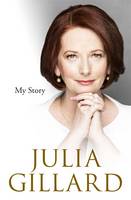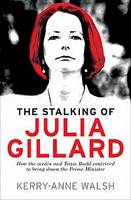Last night I attended Julia Gillard in Conversation, a WORD Christchurch event, in a packed Charles Luney auditorium, St Margaret’s College. The conversation between the former Australian Prime Minister and Press editor Joanna Norris was based on Gillard’s book, My Story. The talk was very insightful – not only about the difficulties of being a politician, but also about being a woman in politics.
 From the perspective of a male attending this session, I found the feminist conversation very interesting. Today’s different feminist perspectives illustrate how far society has moved forward since the 1960s and how the feminist ideology has also changed.
From the perspective of a male attending this session, I found the feminist conversation very interesting. Today’s different feminist perspectives illustrate how far society has moved forward since the 1960s and how the feminist ideology has also changed.
Over her life, Gillard has developed her own independent values which she openly shares and is very willing to debate. When her family settled in Adelaide, Gillard acknowledged that she was “lucky” her parents chose a house in a good suburb that was in a good school zone. From here she flourished and developed ideals such as compassion.
Gillard places great importance on a supportive family, including her sheltered upbringing, a good education, and having a lot of passion. What struck a chord with me was Gillard’s support for gender, socio-economic and ethnic equality. She encourages people to follow their dreams in their chosen field and hopes more females will continue to enter a career in politics.
Gillard shared that she, Prime Minister John Key and United States President, Barack Obama, all share the same birth year of 1961. Growing up in this time and the resulting decades saw Gillard develop a sense of standing up for what she believed in and also accepting differences (true democratic rights). The time a person enters parliament clearly influences the success of their political career. Gillard stated some of the greatest politicians never hold cabinet positions because they are on the wrong side of the benches.
 Gillard is a hard worker, who has continued to achieve. She laughed at the fact she even had her book to the publisher on time. This illustrates her strong work ethic. She stressed the value of preserving a ‘cone of silence’ (while in politics) to plan for the future and to ensure you spend time with family. She acknowledged this was not easy when there is so much to deal with and so many different ways of being immediately contacted – mobile phone, pager, email etc.
Gillard is a hard worker, who has continued to achieve. She laughed at the fact she even had her book to the publisher on time. This illustrates her strong work ethic. She stressed the value of preserving a ‘cone of silence’ (while in politics) to plan for the future and to ensure you spend time with family. She acknowledged this was not easy when there is so much to deal with and so many different ways of being immediately contacted – mobile phone, pager, email etc.
A sense of humour is a must. Gillard highlighted the importance of having to make light of news stories particularly those that are corrosive in nature. Gillard shared a story of her father who questioned whether the media would have enquired about his own sexuality, as he was a barber, in the same way that they did that of her partner’s, Tim, who is a hairdresser. Disappointingly, the media continue to misreport her to this day, most recently at Gough Whitlam’s funeral.
Overall this was an enjoyable event with a very good local turnout. I believe history will look back favourably at Gillard and her work to ensure a more equal society for all.



Add a comment to: Julia Gillard: In Conversation